Flame tree, Flame kurrajong, Bottle Tree
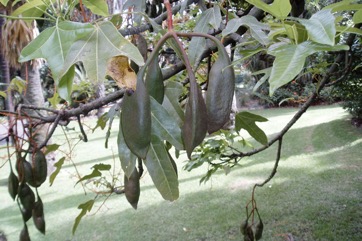
A tropical plant. It is native to N. Australia. It suits tropical and subtropical places. It will grow on a range of soils and in many climatic conditions. It grows naturally in warm, wet, coastal slopes in eastern Australia. In tropical Queensland it grows between sea level and 1000 m altitude. It can stand light frost. It needs well drained soil. It suits hardiness zones 9-10.
Also known as:
Illawarra flame tree, Javorolistno plameneče drevo
Synonyms
- Clompanus acerifolia (A. Cunn. ex G. Don) Kuntze
- Sterculia acerifolia A.Cunn. ex G.Don
Edible Portion
- Seeds, Gum
Where does Flame tree grow?
Found in: Africa, Australia, East Africa, Hawaii, Mozambique, Myanmar, Norfolk Island, Pacific, SE Asia, Singapore, Slovenia, Southern Africa, United States, Zimbabwe
Notes: There are about 30 Brachychiton species. Most are in Australia. Also put in the family Sterculiaceae.
Growing Flame tree, Flame kurrajong, Bottle Tree
Cultivation: Plants can be grown from seed or softwood cuttings. Plants transplant easily. Seeds remain viable for several years. Seeds usually germinate in about 2-4 weeks.
Edible Uses: Caution: The pods have irritant hairs which need to be avoided during harvesting. The seeds are cleaned then roasting makes the skin easier to removed. The seed kernel can also be eaten raw.
Production: It grows slowly in cooler places.
Nutrition Info
per 100g edible portion| Edible Part | Energy (kcal) | Protein (g) | Iron (mg) | Vitamin A (ug) | Vitamin c (mg) | Zinc (mg) | % Water |
|---|---|---|---|---|---|---|---|
| Seed | 462 | 20.3 | 4.3 | - | - | 1.4 | 10.5 |
| Gum | - | - | - | - | - | - |
Flame tree, Flame kurrajong, Bottle Tree Photos

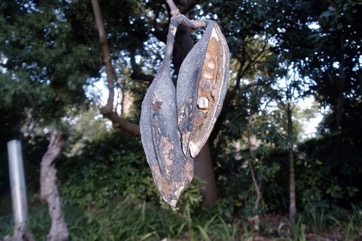
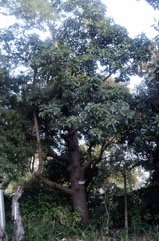
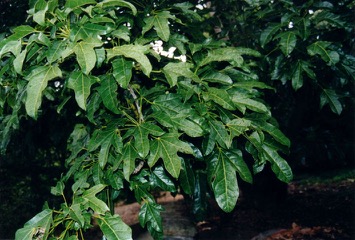
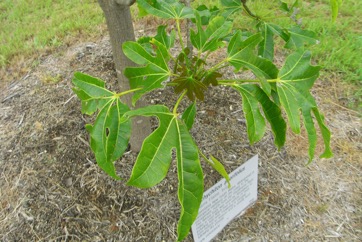
References
Barwick, M., 2004, Tropical and Subtropical Trees. A Worldwide Encyclopedic Guide. Thames and Hudson p 56
Blomberry, A.M., 1979, Australian Native Plants. Angus and Robertson p 184
Bodkin, F., 1991, Encyclopedia Botanica. Cornstalk publishing, p 163
Brickell, C. (Ed.), 1999, The Royal Horticultural Society A-Z Encyclopedia of Garden Plants. Convent Garden Books. p 186
Cat. British Sect. Paris Universal Exhib. 116. 1855 (Hooker's J. Bot. Kew Gard. Misc. 9:198. 1857; W. Macarthur & C. Moore, Cat. coll. bois. indig. 6. 1855, nom. inval.)
Caton, J.M. & Hardwick, R. J., 2016, Field Guide to Useful Native Plants from Temperate Australia. Harbour Publishing House. p 188
Cherikoff V. & Isaacs, J., The Bush Food Handbook. How to gather, grow, process and cook Australian Wild Foods. Ti Tree Press, Australia p 57, 194, 198
Cooper, W. and Cooper, W., 2004, Fruits of the Australian Tropical Rainforest. Nokomis Editions, Victoria, Australia. p 528
Cronin, L., 1989, The Concise Australian Flora. Reed. p 170
Cundall, P., (ed.), 2004, Gardening Australia: flora: the gardener's bible. ABC Books. p 249
Dharani, N., 2002, Field Guide to common Trees & Shrubs of East Africa. Struik. p 60
Elliot, W.R., & Jones, D.L., 1982, Encyclopedia of Australian Plants suitable for cultivation. Vol 2. Lothian. p 364
Etherington, K., & Imwold, D., (Eds), 2001, Botanica's Trees & Shrubs. The illustrated A-Z of over 8500 trees and shrubs. Random House, Australia. p 138
Flora of Australia Volume 49, Oceanic Islands 1, Australian Government Publishing Service, Canberra. (1994) p 109
Greig, D., 1996, Flowering Natives for Home Gardens. Angus & Robertson. p 85
Hall, N. et al, 1972, The Use of Trees and Shrubs in the Dry Country of Australia, AGPS, Canberra. p 202
Hardwick, R.J., 2000, Nature's Larder. A Field Guide to the Native Food Plants of the NSW South Coast. Homosapien Books. p 75
Haslam, S., 2004, Noosa's Native Plants. Noosa Integrated Catchment Assn. Inc. p 327
Hinton, B & B., 1982, A Wilderness in Bloom. Wildflowers of tropical Australia. p 27
Holliday, I., 1989, A Field Guide to Australian Trees. Hamlyn. p 78
Jackes, B.R., 2001, Plants of the Tropics. Rainforest to Heath. An Identification Guide. James Cook University. p 84
Jones D, L, 1986, Ornamental Rainforest Plants in Australia, Reed Books, p 198
Lazarides, M. & Hince, B., 1993, Handbook of Economic Plants of Australia, CSIRO. p 36
Lord, E.E., & Willis, J.H., 1999, Shrubs and Trees for Australian gardens. Lothian. p 12
Low, T., 1991, Wild Food Plants of Australia. Australian Nature FieldGuide, Angus & Robertson. p 183
Low, T., 1992, Bush Tucker. Australia’s Wild Food Harvest. Angus & Robertson. p 92
Molyneux, B & Forrester, S., 1997, The Austraflora A-Z of Australian Plants. Reed. p 57
Nicholson, N & H., 1996, Australian Rainforest Plants, Terania Rainforest Publishing. NSW. p 3, 16
Perry, F., and Hay, R., 1982, Guide to Tropical and Subtropical Plants. Sun Books p 16
Radke, P & A, Sankowsky, G & N., 1993, Growing Australian Tropical Plants. Frith & Frith, Australia. p 24
Ratcliffe D & P., 1987, Australian Native Plants for Indoors. Little Hills press. p 63
Recher, P, 2001, Fruit Spirit Botanical Gardens Plant Index. www.nrg.com.au/~recher/ seedlist.html p 4
Schuler, S., (Ed.), 1977, Simon & Schuster's Guide to Trees. Simon & Schuster. No. 86 (As Brachychiton acerifolium)
Staples, G.W. and Herbst, D.R., 2005, A tropical Garden Flora. Bishop Museum Press, Honolulu, Hawaii. p 544
Steenbeeke, Greg as part of the Plants Directory project. List of plant species from northern NSW that may be used as food plants p 11
Townsend, K., 1994, Across the Top. Gardening with Australian Plants in the tropics. Society for Growing Australian Plants, Townsville Branch Inc. p 104
Wickens, G.E., 1995, Edible Nuts. FAO Non-wood forest products. FAO, Rome. p154
Williams, J.B., Harden, G.J., and McDonald, W.J.F., 1984, Trees and shrubs in rainforests of New South Wales and Southern Queensland. Univ. of New England, Armidale. p 62, 98
www.ceres.org/au/bushfood catalogue
Young, J., (Ed.), 2001, Botanica's Pocket Trees and Shrubs. Random House. p 145